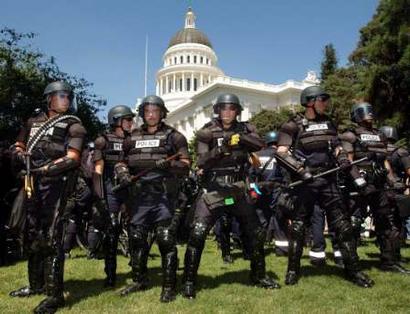A Basic Guide to Interaction with Police
By Andrew M. Somers
(Originally published by CALM, 1998)
Here's a quick guide of important things to remember when interacting with law enforcement officials:
Always Be Calm And Polite
First and foremost remember that police are people too, and also remember that law enforcement is a difficult and dangerous job. With that in mind, you should always deal with the police in a calm, polite, and professional manner. But being polite does not mean that you should ever, under any circumstances, give up your rights.
Never Admit To Anything
You have no obligation to answer any question. If you are in your car, you must provide license, registration, and insurance. Anywhere else, you have no requirement to provide any information, and you cannot be arrested for not talking to the police. However, never badmouth or obstruct the police. If you are being arrested or detained, you have a right to know why. If not, ask if you are free to go and if so leave immediately. Everything you say to the police is important, and may be recorded without your knowledge. Never offer any extra information. lf you do answer questions, keep them very short and to the point, and most important, Never confess - it does not help you.
Insist On Seeing A Lawyer
You have a legal right to speak with a lawyer. Never speak to the police without at least consulting one. If you speak to the police without a lawyer, you have given up one of your most important rights. Never agree to go to the police station to answer questions or submit to interrogation. Never confess - it does not help you.
Always protest A Search
Even if the search is by a court ordered warrant you should always make it very clear that any entry onto your premises is fully against your wishes , and that YOU DO NOT CONSENT IN ANY WAY TO THE SEARCH. Never cooperate in a search - it does not help you.
Never Invite The Police Into Your Home, Office or Car
Any lack of protest can be considered an invitation. If they ask if they may enter, and you do not immediately voice your strong protest , this may be construed as an invitation on your part. This voids your right to privacy, and you lose this right later in court. Never cooperate in a search - it does not help you.
The Police Can and Do Lie
The supreme court has upheld that the police can lie to you for any reason. The police cannot lie in court, or in official documents, (although some do). If you ask a plain-clothes police officer if they are the police, they can lie and say that they are not (this is one of the most common misunderstandings by citizens if you ask an undercover cop if they are the police, they can legally say no, and claim to be something else). In fact an undercover police officer can take illegal drugs with you to "prove" they aren't police. The police can lie about evidence they have about you (they can fabricate ''fake'' evidence to convince you to confess, for example). Fake evidence cannot be used in court, but if it makes you confess, it no longer matters. Never confess - it does not help you.
Be Aware Of Your Body Language and Eye Movements
Be conscious of your body language and eye movements . The police (especially interrogators) are very well trained in reading your body language and eye movements. These are involuntary movements that you make, and reveal your state of mind, and even if you are lying or telling the truth. Remain calm, do not react to questions, and never offer any information or answer a question you do not want to. Never confess or cooperate in a search - it does not help you and it will not make the justice system more lenient on you - EVER.
Most important: Remember that the justice system is never more lenient on you when you give up your rights. Confessing or cooperating will only make things harder on you. When you give up your rights, you also give up any hope of being treated fairly. Always be polite and courteous, but never cave in and waive your rights. EVER.
It Can't Happen Here (by Congressman Ron Paul)

